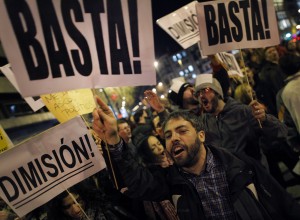Two landmark cases, involving ruling party and royalty, leave citizens with a sense of déjà vu
BUENOS AIRES — Yesterday’s news that Princess Cristina had been indicted and named as a formal suspect in an investigation into alleged corruption was, for many, a landmark moment in a landmark case.
Up until now, Spain’s Royal family had been able to claim that the king’s blood relatives have been clean, despite the fact that Cristina’s husband, Iñaki Urdangarin, was accused of embezzlement months ago, along with his former business partner, Diego Torres.
That line of defence has now been eliminated and Cristina, the second-youngest daughter of King Juan Carlos, will become the first Royal to appear in court since the monarchy was restored in 1975. The princess, 48, will face questions over alleged money-laundering and tax evasion.
But this is not the only landmark case that’s on the minds of Spaniards of late. The “Nóos Case,” as it has become known, is just one of a number of high-level corruption scandals which involve people in positions of power or authority.
For example, former Caja Madrid boss Miguel Blesa has also been accused of corruption stemming from his time in charge of the savings bank. He has complained of persecution and has even launched a complaint against the judge who was previously in charge of his trial.
But the most famous case — one that brought Spaniards onto the streets in protest last year— remains the “Bárcenas case,” which implicates the ruling Popular Party (PP), led by Prime Minister Mariano Rajoy.
In this scandal, the PP’s former treasurer, Luis Bárcenas, is accused of running a secret slush-fund that paid off party officials with money from figures in the construction business. Some estimates put the money involved in the scam at a whopping 48 million euros.
While Bárcenas was removed from his position in 2009, he continued to receive financial support from the PP. Four years on, he is now in prison yet still awaiting a trial.
The scandals have come at a particularly bad moment for Spain, at a time of great economic crisis with huge amounts of ordinary citizens out of work and a government committed to cuts in public spending. And they’re undermining faith in the government and in the country’s institutions.
HIGHEST ECHELONS
There are some similarities in the Bárcenas case and the Noós case. Both have touched the highest echelons of society: Royalty in one case and the prime minister in another.
Rajoy, despite not admitting to any crime, was forced onto the defensive last year when the scandal broke, conceding to Spanish lawmakers in Parliament that he shouldn’t have placed his trust in Bárcenas. The excrutiating debate on the issue, televised live, lasted five-and-a-half hours.
It will be interesting to see what Princess Cristina has to say when she appears in a court in Palma de Mallorca on March 8, later this year.
Both cases also, allegedly, involve similar schemes of shadow-accounting and shell companies. Cristina, Urdangarin and Torres are accused of using their non-profit organization Instituto Nóos and their family business, Aizoon (co-owned by the princess). as shell companies for their alleged illegal activities. Bárcenas, according to the allegations aired in court, is accused of using various shell companies and Swiss bank accounts to take and give bribes and avoid taxation.
Similar charges, similar techniques.
FALL-OUT
What the fall-out will be from these scandals is, as yet, unclear, but an opinion poll carried out over the weekend said that 62 percent of citizens would like King Juan Carlos to abdicate as monarch. Whether this number remains the same after yesterday’s news is doubtful.
A Spanish journalist, speaking to the BBC yesterday, said the country’s citizens were happy with the Nóos case and the way it is progressing.
“Most people will tell you that they felt more relieved than shocked and this includes even people who are sympathetic to the royal family,” said Miguel Anxo Murado, a contributor to The Guardian and The Huffington Post.
“Whether it will be sufficient for many people in this environment of economic crisis, well, that remains to be seen,” he added.
How the anger in ordinary Spaniards, sparked by these scandals, will translate into action against the political establishment remains to be seen. While the PP is not exactly popular of late, it has polled better than its socialist rivals, the PSOE.
Three months ago, a survey carried out by El País said 34.1 percent of citizens would vote for the PP in an election — indicating that support for the party is rising as revelations from the Bárcenas case fade with time. That figure is below the 44.6 percent of the vote the PP took in the last parliamentary election in 2011, but still enough defeat the PSOE, who the survey said would take just 29 percent.
Originally published in the Buenos Aires Herald, on Wednesday, January 8, 2013.
Link: http://www.buenosairesherald.com/article/149152/corruption-scandals-provoke-spanish-ire.
© J. GRAINGER, 2013
https://www.google.com/url?sa=t&rct=j&q=&esrc=s&source=web&cd=1&cad=rja&ved=0CCYQFjAA&url=http%3A%2F%2Fwww.buenosairesherald.com%2Farticle%2F149152%2Fcorruption-scandals-provoke-spanish-ire&ei=juHyUs39D4bisATq6ILQDA&usg=AFQjCNEv_PENWmW_qiBZmw6LlDgpht6UaA&sig2=4OI8PZNDEoi_KokJKAucWw&bvm=bv.60799247,d.cWc

